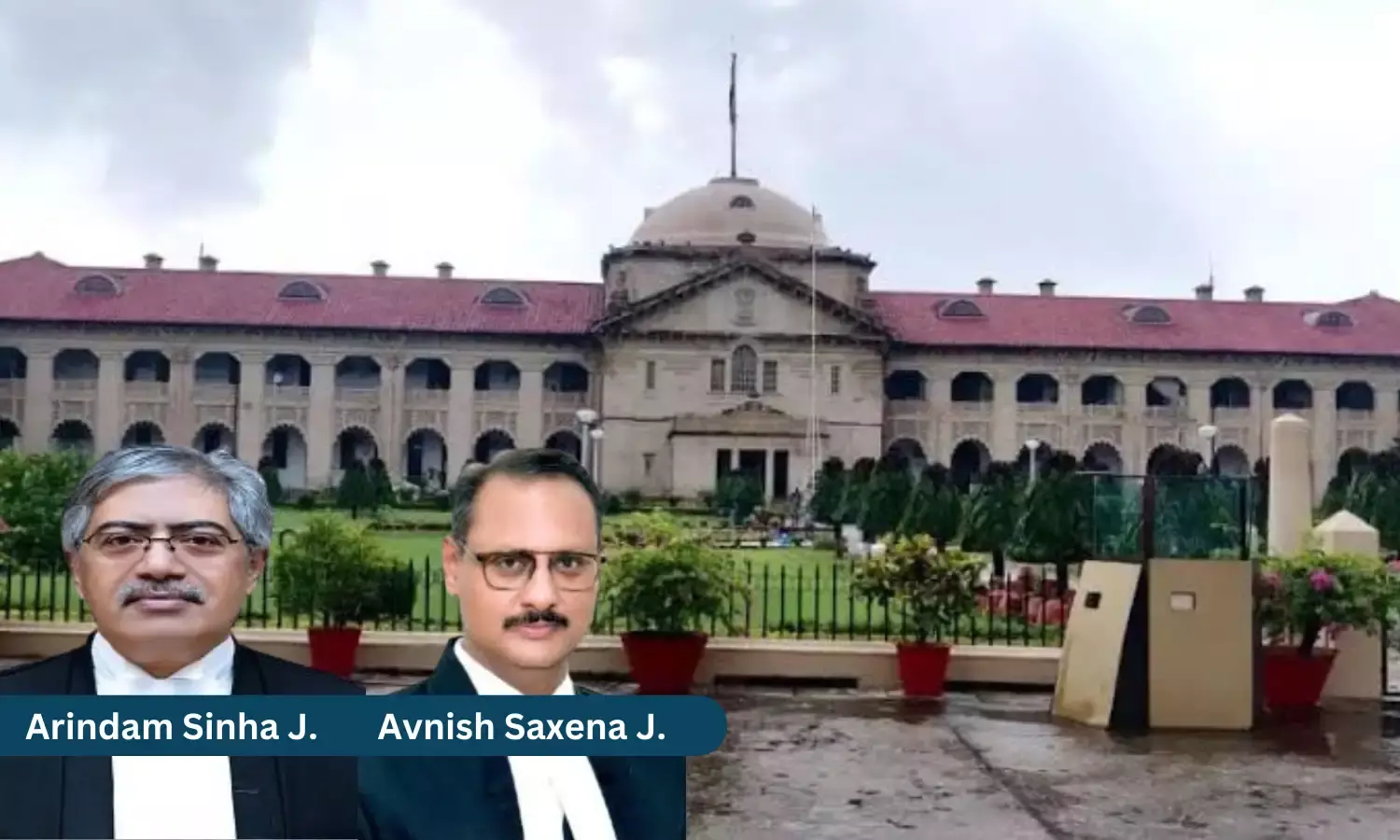Issue Of Return Of ‘Streedhan’ Is To Be Determined At Trial & Not Independently On Application U/S.27 HMA: Allahabad High Court
The appeal before the Allahabad High Court was preferred by the appellant-husband against the judgment directing him to pay Rs 10,54,364 in lieu of return of 'streedhan’ articles.

Justice Arindam Sinha, Justice Avnish Saxena, Allahabad High Court
The Allahabad High Court has held that the return of ‘streedhan’ has to be an issue to be determined at trial in a proceeding under the Hindu Marriage Act, 1955 and not independently on an application made under section 27.
The appeal before the High Court was preferred by the appellant-husband against the judgment directing the appellant to pay Rs 10,54,364 in lieu of returning 'stree dhan’ articles.
The Division Bench of Justice Arindam Sinha and Justice Avnish Saxena said, “We respectfully agree with view taken in Babita @ Gyatri (supra) that section 27 has not been considered to be a separate and independent matrimonial proceeding so as to entitle the Court to entertain such independent application. The Division Bench went on to refer to a judgment of the Supreme Court in Balkrishna Ramchandra Kadam vs. Sangeeta Balkrishna Kadam reported in AIR 1997 SC 3562 to say, the Apex Court had said, section 27 provides alternative remedy to the wife so that she can recover the property, which is covered by the section. Accordingly we hold, return of ‘stree dhan’ has to be an issue, to be determined at trial in a proceeding under the Act and not independently on application made under section 27.”
Factual Background
In this case, the marriage between the parties was subsequently dissolved in 2023. Prior to that the respondent had filed an application and obtained an order directing the payment of maintenance under section 125 of the Code of Criminal Procedure, 1973. The Appellant earlier paid Rs 6 lakh and had handed up the said demand draft for payment of another Rs 1 lakh.
Arguments
It was the appellant’s case that when the marriage stood dissolved there was no direction for maintenance nor any direction regarding 'stree dhan'. Such direction could only have been made in a decree passed in the proceeding for dissolution of the marriage, but not otherwise. It was also argued that the impugned judgment was made invoking a provision in section 27 of the Hindu Marriage Act, 1955. It allows for the inclusion of such provisions in the decree concerning joint property, presented at or about the time of marriage. There cannot be an independent order made under the provision.
Reasoning
The Bench found that the jewellery receipts tendered by the respondent were photocopies. There was no indication as to why they were accepted as secondary evidence. The impugned judgment did not say that in the application, the appellant had been accused of forcibly snatching jewellery from the respondent, torturing her, and throwing her out of the house.
It was the Respondent’s case that they were receipts for jewellery purchased by her side and given to her as ‘stree dhan’. The Appellant, therefore, could not have known the transactions reflected in the copy receipts, for him to be saddled with admission, required as proof to act upon the copy documents. Addressing this contention, the Bench said, “A document can only be proved by the maker of it. It may also be proved by someone receiving an original document, who testifies that he witnessed the maker of it, making it and handing it over to the witness. As aforesaid, there is no indication why secondary evidence was admitted. On tender of the photocopies and omission to object, inference of admission was drawn, to rely upon the documents. That would only prove purchase. Possession of the ‘stree dhan’ jewellery, still was needed to be established”, the Bench said.
The Bench was of the view that the issue of return of ‘stree dhan’ had to be determined at trial in a proceeding under the Act and not independently on an application made under section 27.
The Bench also explained that section 25 allows for a spouse to, after a decree for dissolution of marriage, apply for direction on maintenance, either by monthly or gross sum. Section 27 empowers the Court to pass a decree to include provisions in it concerning any property presented, at or about the time of marriage, which may belong jointly to the parties. However, there was no direction in respect of property, joint or otherwise, made in the judgment dissolving the marriage.
Setting aside the impugned judgment, the Bench noted that in addition to an aggregate of Rs 7 lakh, the respondent recovered Rs 2,10,000 by part execution of the impugned judgment. “Said sum be also adjusted against respondent's claim pursuant to said maintenance order dated 11th August, 2017 made under section 125 in Code of Criminal Procedure, 1973. We direct accordingly, in exercise of our appellate power under rule 33 in order XLI, Code of Civil Procedure, 1908”, it further ordered.
The Bench also took note of the contention that the appellant was unsuccessful in seeking review of the impugned judgment, as well as had not preferred an appeal against the execution proceeding initiated by her. The Bench held that so far as the execution is concerned, appellant having succeeded in the appeal, the execution case must be dropped.
Cause Title: A v. B (Neutral Citation: 2025:AHC:87646-DB)
Appellant: Advocate Ambrish Kumar Pandey, Lok Nath Shukla
Respondent: Advocate Gyanendra Singh

